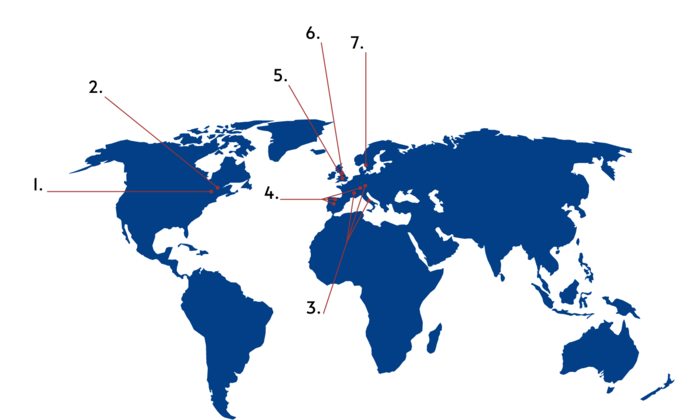Subject Area and Research Team: VIII. Optimization of cancer management
Research topics
1. Childhood malignancies. Optimization of cancer care. Nutritional status of children with cancer and childhood cancer survivors. Standardization of surgical treatment
2. Breast cancer. Increasing quality of life and treatment efficacy. Focus on special breast cancer populations The impact of physical activity on treatment outcomes
3. Lung cancer. Innovative systemic therapies
4. Brain metastases. Novel therapeutic approaches based on biological knowledge
5. Body composition parameters. Prognostic value of sarcopenia in childhood malignancies. Cancer-associated cachexia in lung cancer
Coordinators
| Coordinator #1 | Coordinator #2 | |
|---|---|---|
| Name and surname |  Prof. Jacek Jassem |
 |
| Academic degree | Prof. Dr. Habil. | Prof. Dr. Habil. |
| Employment unit | Department of Oncology & Radiotherapy | Department of Paediatrics, Haematology & Oncology |
| Polish Platform of Medical Research | Prof. Dr. Habil. Jacek Jassem | Prof. Dr. Habil. Ewa Bień |
| jacek.jassem@gumed.edu.pl | ewa.bien@gumed.edu.pl | |
| Phone number | +48 58 349 45 10 | +48 58 349 28 70 |
photo Paweł Sudara/MUG
Research Team: VIII. Optimization of cancer management
Team Members: VIII. Optimization of cancer management (178 KB)Feel free to contact one of our coordinators to join our Research Team.
Key current projects
1. Body composition analyses and its prognostic significance in NSCLC patients
2. Genomic characterization of brain metastases in lung cancer, breast cancer and ovarian cancer
3. Generation of updated recommendations on the use of orthotopic liver transplantation vs. aggressive resection for locally advanced hepatoblastoma
4. Standardization of methods of assessing the quality of surgical treatment of solid tumours in children
5. Paediatric rare tumours, European registry for very rare tumours in children, management of VRT in various EU countries, integration of widening EU countries
Key grants
| Funding agency/grant number | Title of the project | Years | |
|---|---|---|---|
| 1. | Rosetrees Trust / M 781 | Cancer-associated cachexia in lung cancer | 2018-2021 |
| 2. | Consumers, Health, Agriculture and Food Executive Agency (CHAFEA) – 3rd Health EU Programme/HP-PJ-06-2016 | European Reference Network (ERN)-PAEDCAN Paediatric Rare Tumours Network – European Registry | 2017-2021 |
| 3. | Polish National Science Centre; SONATA12; grant 2016/23/D/NZ2/02890 | Molecular profiles of brain metastases in lung cancer | 2016-ongoing |
| 4. | Polish National Science Centre, grant 2017/25/B/NZ5/00656 | A clinicopathological analysis of breast cancer with single hormone receptor positive phenotype including a quantitative evaluation of oestrogen and progesterone receptor expression and microRNA expression profile | 2018-ongoing |
| 5. | COST CA19138 | Lobular Breast Cancer: Discovery Science, Translational Goals, Clinical Impact (LOBSTERPOT) | 2020-ongoing |
| 6. | European Commission/ Horizon 2020 programme project No. 668596 | ChiLTERN – Children’s Liver Tumour European Research Network | 2016-2021 |
| 7. | ABM-SEK-1292/2020/WFK/ŁB | Cyclin dEpendent kinase in tRiple nEGatIVe brEast canceR – a “window of opportunity” study (CAREGIVER) | 2020-ongoing |
International cooperation
| Foreign partner (unit name) | Principal investigator(s) | Area of cooperation | |
|---|---|---|---|
| 1. | Women’s Malignancies Branch, Center for Cancer Research, National Cancer Institute, Bethesda, USA | Patricia Steeg, Priscilla Brastianos | Genomic characterization of brain metastases |
| 2. | University of Harvard, Dana Farber Cancer Institute, Radiation Oncology | Hugo Aerts | Body composition analyses and its prognostic significance in NSCLC patients |
| 3. | European Cooperative Study Group on Pediatric Rare Tumors (EXPeRT) | Andrea Ferrari, Gianni Bisogno, Italy, Dominik Schneider, Ines Brecht, Germany, Daniel Orbach, Yves Requerre, France | European registry for very rare tumors in children |
| 4. | Oncologia/Hematologia Pediatrica Hospital Universitario de Cruces, Spain, Vascular Anomalies Center, la Paz Hospital, University of Madrid, Spain, Cooperative Weichteilsarkom Studiengruppe trial, Stuttgart, Germany | Ricardo Lopez-Almaraz ,Juan-Carlos Lopez-Guthierrez, Monika Sparber-Sauer, Ewa Koscielniak | Vascular tumours in children |
| 5. | University College London, Cancer Institute | Charles Swanton | Gene expression prognostic test for patients with early stage NSCLC |
| 6. | Univesity of Cambridge, Wellcome-MRC Institute of Metabolic Science | Stephen O’Rahilly | GDF15 cytokine as a marker of body weight and adipose tissue compartment loss at lung cancer recurrence |
| 7. | Chalmers University of Technology, Sweden | Jens Nielsen, Francesco Gatto | Glycosaminoglycan profiling as non-invasive biomarkers for early stage breast cancer – a pilot study |

Key publications
1. Herbst RS, Giaccone G, de Marinis F, Reinmuth N, Vergnenegre A, Barrios CH, Morise M, Felip E, Andric Z, Geater S, Özgüroğlu M, Zou W, Sandler A, Enquist I, Komatsubara K, Deng Y, Kuriki H, Wen X, McCleland M, Mocci S, Jassem J, Spigel DR. Atezolizumab for First-Line Treatment of PD-L1-Selected Patients with NSCLC. N Engl J Med. 2020; vol. 383: p.1328-1339.
2. Carrillo-Reixach J, Torrens L, Simon-Coma M, Royo L, Domingo-Sàbat M, Abril-Fornaguera J, Akers N, Sala M, Ragull S, Arnal M, Villalmanzo N, Cairo S, Villanueva A, Kappler R, Garrido M, Guerra L, Sábado C, Guillén G, Mallo M, Piñeyro D, Vázquez-Vitali M, Kuchuk O, Mateos ME, Ramírez G, Santamaría ML, Mozo Y, Soriano A, Grotzer M, Branchereau S, de Andoin NG, López-Ibor B, López-Almaraz R, Salinas JA, Torres B, Hernández F, Uriz JJ, Fabre M, Blanco J, Paris C, Bajčiová V, Laureys G, Masnou H, Clos A, Belendez C, Guettier C, Sumoy L, Planas R, Jordà M, Nonell L, Czauderna P, Morland B, Sia D, Losic B, Buendia MA, Sarrias MR, Llovet JM, Armengol C. Epigenetic footprint enables molecular risk stratification of hepatoblastoma with clinical implications. J Hepatol. 2020; vol. 73: p. 328-341.
3. Robson M, Im S-A, Senkus E, Xu B, Domchek SM, Masuda N, Delaloge S, Li W, Tung N, Armstrong A, Wu W, Goessl C, Runswick S, Conte P. Olaparib for Metastatic Breast Cancer in Patients with a Germline BRCA Mutation. N Engl J Med 2017; vol. 377: p. 523-533.
4. Peters S, Camidge DR, Shaw AT, Gadgeel S, Ahn JS, Kim DW, Ou SI, Pérol M, Dziadziuszko R, Rosell R, Zeaiter A, Mitry E, Golding S, Balas B, Noe J, Morcos PN, Mok T; ALEX Trial Investigators. Alectinib versus crizotinib in untreated ALK-positive non-small-cell lung cancer. N Engl J Med. 2017; vol. 377: p. 829-838.
5. Meyers RL, Maibach R, Hiyama E, Häberle B, Krailo M, Rangaswami A, Aronson DC, Malogolowkin MH, Perilongo G, von Schweinitz D, Ansari M, Lopez-Terrada D, Tanaka Y, Alaggio R, Leuschner I, Hishiki T, Schmid I, Watanabe K, Yoshimura K, Feng Y, Rinaldi E, Saraceno D, Derosa M, Czauderna P. Risk-stratified staging in paediatric hepatoblastoma: a unified analysis from the Children’s Hepatic tumors International Collaboration. Lancet Oncol. 2017; vol. 18: p. 122-131.
6. Gril B, Paranjape AN, Woditschka S, Hua E, Dolan EL, Hanson J, Wu X, Kloc W, Izycka-Swieszewska E, Duchnowska R, Pęksa R, Biernat W, Jassem J, Nayyar N, Brastianos PK, Hall OM, Peer CJ, Figg WD, Pauly GT, Robinson C, Difilippantonio S, Bialecki E, Metellus P, Schneider JP, Steeg PS. Reactive astrocytic S1P3 signaling modulates the blood-tumor barrier in brain metastases. Nat Commun. 2018; vol. 9: p. 2705.